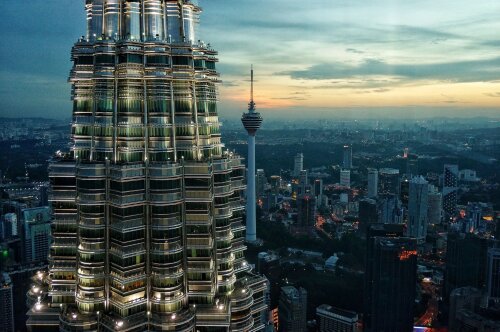Best Climate Change Law Lawyers in Kuala Lumpur
Share your needs with us, get contacted by law firms.
Free. Takes 2 min.
List of the best lawyers in Kuala Lumpur, Malaysia
About Climate Change Law in Kuala Lumpur, Malaysia
Climate change law focuses on the legal aspects of addressing and mitigating climate change impacts at the global, national, and local levels. In Kuala Lumpur, Malaysia, climate change law is governed by a mix of international commitments, national policies, and local regulations designed to reduce greenhouse gas emissions, encourage sustainable development, and adapt to climate change effects. As Malaysia actively participates in global environmental agreements and incorporates climate policies into domestic law, individuals, businesses, and organizations may be affected by evolving compliance requirements and obligations.
Why You May Need a Lawyer
Legal issues in climate change law can be complex due to overlapping regulations and evolving standards. You may need a lawyer for several reasons, including:
- Advice on environmental compliance and carbon emission regulations
- Navigating permits, licenses, and approvals for construction, manufacturing, or energy projects
- Representing companies or individuals facing penalties for violating environmental laws
- Consulting on green technology investments or sustainable finance
- Drafting and reviewing contracts with climate change-related clauses or sustainability goals
- Guidance for participation in carbon trading and offset initiatives
- Assistance with disputes regarding land use, pollution, or community rights
- Advising non-governmental organizations on climate advocacy and litigation
Lawyers specializing in climate change law can offer tailored advice to navigate legal risks, minimize liabilities, and ensure compliance with the latest regulations.
Local Laws Overview
Climate change law in Kuala Lumpur is guided by a framework that includes national legislation and local implementation. Key aspects include:
- Environmental Quality Act 1974 (EQA): The primary statute regulating environmental protection in Malaysia, establishing standards for pollution control, environmental impact assessments, and enforcement.
- National Climate Change Policy (NCCP): Outlines Malaysia’s strategic direction for climate resilience and low carbon growth, influencing city-level policies in Kuala Lumpur.
- Renewable Energy Act 2011: Promotes the use of renewable energy resources and sets mechanisms for feed-in tariffs.
- Kuala Lumpur Structure Plan and Local Plans: City-level policies address urban sustainability, flood management, and transportation emissions.
- Participation in International Agreements: Malaysia is a signatory to the Paris Agreement and the United Nations Framework Convention on Climate Change (UNFCCC), which shape domestic law and policy.
- Energy Efficiency and Green Building Requirements: Mandates for new developments and retrofitting of existing infrastructure to reduce carbon footprints.
If you are involved in industrial, commercial, or construction activities, or are planning green initiatives in Kuala Lumpur, understanding these laws is crucial for compliance and sustainable operations.
Frequently Asked Questions
What is climate change law and how does it apply in Kuala Lumpur?
Climate change law consists of legal rules, policies, and practices designed to combat climate change by reducing emissions and promoting sustainability. In Kuala Lumpur, it affects urban development, industry practices, and public policy through local ordinances and national legislation.
Which governmental body enforces environmental laws related to climate change?
The Department of Environment Malaysia under the Ministry of Natural Resources, Environment and Climate Change is mainly responsible for enforcing environmental and climate change-related laws.
What are the penalties for non-compliance with environmental regulations in Kuala Lumpur?
Penalties can include fines, suspension or revocation of licenses, orders to cease operations, and, in severe cases, imprisonment. The severity depends on the nature and impact of the violation.
Do businesses in Kuala Lumpur need special permits to build eco-friendly projects?
Yes, businesses must obtain relevant permits and approvals, such as Environmental Impact Assessment (EIA) approval and other licenses required by local authorities, especially for projects that may affect the environment.
Is carbon trading legal in Malaysia?
Carbon trading is being developed in Malaysia through schemes like the Voluntary Carbon Market, and initiatives are supported by relevant governmental frameworks but are still evolving.
How does the law address large-scale pollution or emission incidents?
The Environmental Quality Act prescribes requirements for handling, reporting, and remediating pollution incidents. Legal liability rests with the polluter and may include civil or criminal penalties.
Can individuals take legal action for climate change-related harm?
Individuals and communities affected by environmental harm may seek remedies through court action or by submitting complaints to regulatory authorities for investigation.
Are there incentives or support for adopting green technology or renewable energy?
The government offers various incentives, tax relief, and grants for adopting renewable energy, energy efficiency improvements, and green technology, as detailed in schemes under the Sustainable Energy Development Authority.
How does Malaysia’s participation in international agreements affect local laws?
Compliance with global agreements like the Paris Agreement influences domestic policy-making and results in updates to local regulations to meet international commitments.
Where can I find up-to-date information on climate change policies in Kuala Lumpur?
You can find information on official government websites, publications from environmental agencies, and by consulting with legal professionals specializing in environmental or climate change law.
Additional Resources
If you need more information or assistance, consider consulting the following resources and organizations:
- Department of Environment Malaysia (DOE) - for compliance guidance and environmental regulations
- Ministry of Natural Resources, Environment and Climate Change - for national policies
- Sustainable Energy Development Authority (SEDA Malaysia) - for renewable energy programs and incentives
- Malaysian Green Technology and Climate Change Corporation (MGTC) - for technology-driven solutions and grants
- Kuala Lumpur City Hall (DBKL) - for local urban planning and sustainability initiatives
- Universities and research institutes offering environmental law clinics or public seminars
- Bar Council of Malaysia or Kuala Lumpur Bar Committee for lawyer directories and referrals
Next Steps
If you require legal assistance with climate change law in Kuala Lumpur, the following steps can help guide your process:
- Identify the specific issue or area of concern, such as compliance, permits, or dispute resolution.
- Compile all relevant documents, correspondence, and regulatory notices.
- Consult a lawyer experienced in environmental or climate change law for a preliminary assessment.
- Contact local legal associations or regulatory bodies for reputable lawyer referrals if needed.
- Prepare a list of questions and desired outcomes to discuss with your legal representative.
Staying informed and seeking timely legal advice is key to navigating the complex and developing field of climate change law in Kuala Lumpur, Malaysia.
Lawzana helps you find the best lawyers and law firms in Kuala Lumpur through a curated and pre-screened list of qualified legal professionals. Our platform offers rankings and detailed profiles of attorneys and law firms, allowing you to compare based on practice areas, including Climate Change Law, experience, and client feedback.
Each profile includes a description of the firm's areas of practice, client reviews, team members and partners, year of establishment, spoken languages, office locations, contact information, social media presence, and any published articles or resources. Most firms on our platform speak English and are experienced in both local and international legal matters.
Get a quote from top-rated law firms in Kuala Lumpur, Malaysia — quickly, securely, and without unnecessary hassle.
Disclaimer:
The information provided on this page is for general informational purposes only and does not constitute legal advice. While we strive to ensure the accuracy and relevance of the content, legal information may change over time, and interpretations of the law can vary. You should always consult with a qualified legal professional for advice specific to your situation.
We disclaim all liability for actions taken or not taken based on the content of this page. If you believe any information is incorrect or outdated, please contact us, and we will review and update it where appropriate.

















